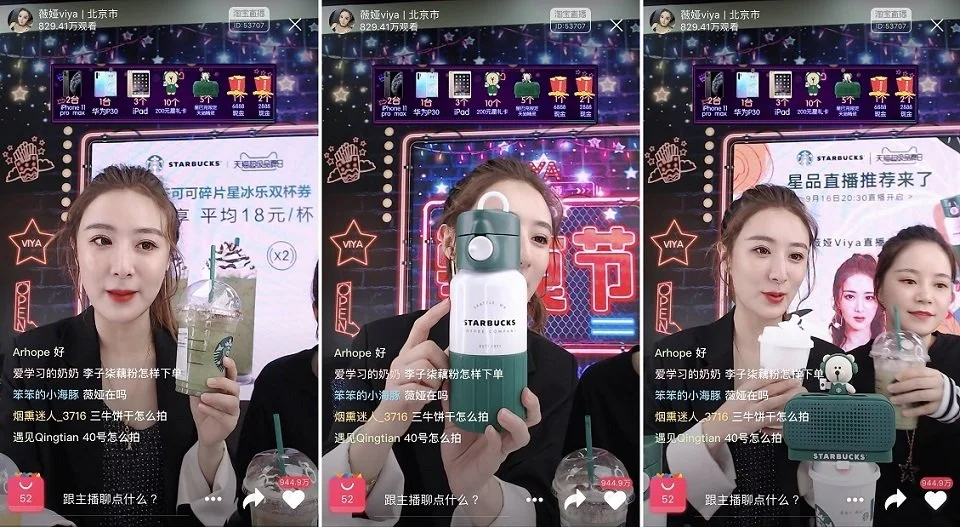A Glance of Shoppable Livestream Industry in China
Chinese media reported that famous live-streaming influencer Viya had been fined more than 1.34 BILLION RMB for tax evasion. Viya was one of the most famous live streaming influencers, and the media reported her net wealth is comparable to a publicly listed company.
Influencer e-commerce has opened a new era, creating "New Wealth" and changing consumers' shopping habits, traditional supply chains, the profit distribution in each link of e-commerce, even developing a whole industry around shoppable livestream.
Live stream marketing can be traced back to TV shopping in the 1990s with jingles and advertising words. The audience once favoured cosmetics, weight loss pills, massage chairs, and various home appliances on TV shopping. These programs may seem exaggerated and overstated, but catered to the preferences of homebodies with a sense of novelty. The strong profitability of TV shopping has supported several publicly-listed companies.
Social Media Marketing 1.0
TV shopping has encountered negative growth after reaching its peak in 2015. Though TV shopping has been gradually withdrawn from the public view, it confirmed the considerable market of "lazy economy." With the rise of social media, internet celebrities have replaced the TV shopping host. Weibo, Chinese Twitter + Instagram, with more than 500 million users, have become the most used platform for early internet celebrities. They accumulated fans with well-designed photos and stories first and then converted them into product users.
The explosion of social media marketing changed shopping habits; thus, it changed the original wholesale business of factories. The frequency of launching new products increased to monthly, and some can even reach weekly updates. Influencers use pre-sales to determine the number of orders. Instead of bulk-ordering, the orders are of small quantities with multiple styles.
Online Shoppable Livestream
From the end of 2015, China's live-streaming industry experienced rapid growth, with thousands of startups flooding into the market and large companies preparing for the trend. In March 2016, Taobao Live Streaming was the first to go online. In 2017, Kuaishou began the attempts of live stream marketing. Meanwhile, Douyin enabled selling in short videos and live streams. In April 2019, WeChat Official Account started the shoppable live stream feature.
The most popular live-streaming influencers are Li Jiaqi and Viya. Li Jiaqi was once a beauty shopping guide. He had set a record of selling out 15,000 lipsticks in 5 minutes in his live streaming. He even beat Jack Ma in a shoppable live stream competition.
Viya has nearly 20-year of experience in the fashion industry. In 2003, she and her boyfriend opened their first women's clothing store across the Beijing Zoo wholesale clothing market. In 2005, Viya participated in the Anhui TV talent show and won, making her official debut in the Chinese mainland entertainment industry. Viya also collaborated with JJ Lin, Jackie Chan, and Tong Anger. In 2008, Viya went to Xi'an to open seven clothing stores, with each profitable. From 2014, Viya's team switched their focus to internet stores and finally found their way into shoppable live streams in 2016.
The supply chain behind live streamers is expanding. Live streamers are also transitioning from a solitary fight to a complete industry system. Multi-Channel Network agencies keep cultivating celebrities.
However, it is not easy for the live streamers to keep their current status, who need to make a lot of effort to maintain the "waves." A rapid rise means a low entry barrier and a much shorter period building competitive advantages. Thus, weblebrities themselves also started MCN business. Zhang Dayi, as the majority shareholder of Ruhan Holdings, publicly listed her business in the United States in 2019. The company, with 113 celebrities, reached 148 million fans and annual revenue of nearly 1 billion, known as "China's first stock of e-commerce."
All in all, from the first TV shopping in 1992 to current internet live streams, the "shoppable live stream" mode has been on for 30 years. The history of shoppable live streaming is also a history of the change of Internet traffic. Wherever the internet traffic is, the internet celebrities are there. They have moved from TV and around multiple social media channels: Weibo, WeChat, live streaming platforms, Taobao, Douyin, Kwai, etc. The content and form may have changed, but the truth of attracting, influencing, promoting to eventually selling has never changed.


